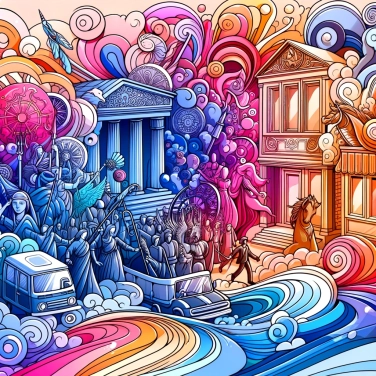Coffee was originally banned in some cultures because of its stimulating effects on the nervous system, which were seen as contrary to the religious or moral practices in place at the time.

In certain religious contexts, particularly in the Muslim world of the 16th century, coffee was initially viewed as a suspect, even problematic beverage. The stimulating effect of coffee raised concerns because it resembled a light intoxication, contrary to certain religious principles. Some religious leaders believed that coffee encouraged people to spend unnecessary time in cafes, engaging in discussions considered immoral or unproductive, and neglecting their spiritual obligations. As a result, consumption was sometimes seen as contrary to good moral and religious practices. Several Islamic authorities then imposed temporary bans in cities like Mecca and Cairo. On the Christian side in the West, some clerics even referred to coffee as the "devil's drink", due to its foreign and Muslim origins, and its stimulating effects which were viewed as suspect. These bans did not last long, but they illustrate how a small cup of coffee could create moral and religious upheaval.
At certain times, coffee seriously disturbed those in power with its unifying nature. Cafés, public places where people gathered to discuss politics or exchange new ideas, particularly worried the leaders. They saw these establishments as potential spaces for dissent, even rebellion. As a result, many monarchs and government authorities attempted to ban or restrict coffee consumption to prevent the spread of thoughts deemed too rebellious or dangerous to the established order.
Even from an economic standpoint, it was tense: coffee threatened the financial interests tied to other beverages like beer or wine, which generated lucrative tax revenues at the time. It's no wonder that influential lobbyists and merchants pressured authorities to prevent the growing popularity of this "foreign" drink from harming their businesses.
When coffee arrived in Europe and the Middle East, it quickly made people wary. At the time, it was believed that its stimulating properties could lead to disorders ranging from insomnia to complete imbalance of body and mind. Some doctors even claimed it dried out the brain or caused impotence. Others viewed coffee as dangerous, capable of triggering heart diseases or uncontrollable tremors. With all these accumulated concerns, it is understandable that authorities eventually banned or strongly discouraged this new, strange, and exciting beverage.
When it was introduced, coffee was perceived by many as a foreign drink that disrupted established habits. Some societies clearly preferred their traditional beverages like tea, beer, or wine, which were deeply rooted in their social customs. Consequently, this drink from abroad appeared as a suspicious intruder, sometimes even representing a threat to cultural identity. In Europe, for example, quite a few people viewed these cafés filled with discussions unfavorably, fearing that this exotic place would weaken local traditions. Thus, coffee sparked a distrust that went beyond issues of taste or health, but rather stemmed from a cultural defense reflex in response to something new and unknown.
When coffee arrived in certain regions, it quickly became a sensation, especially in the form of coffeehouses, places where people freely discussed, debated politics, and exchanged ideas. These spots rapidly gained popularity as they allowed for open criticism of those in power and questioned the established order, without strict control from the authorities. Naturally, this did not sit well with those in charge, who feared that coffee would lead to social unrest, protest gatherings, or riots. Some leaders viewed it as a direct threat to public stability and attempted to shut down these places or even prohibit coffee consumption altogether to maintain order and avoid any risk of rebellion or popular insurrection.
In the 16th century, some Ottoman leaders feared that public coffee houses might serve as gathering places for political opponents, leading to their temporary closure or prohibition.
Pope Clement VIII was invited to condemn coffee in 17th century Europe, but after tasting it, he publicly approved it, thus contributing to the popularization of this beverage in the Christian world.
In Sweden, during the 18th century, coffee was banned for health and economic reasons, prompting King Gustav III to conduct a strange medical experiment to prove its dangers — but the experiment inadvertently demonstrated the relative harmlessness of coffee.
In certain historical Arab regions, it was believed that coffee had mystical and spiritual virtues, promoting meditation and prayer, which is why it initially gained popularity among members of Sufism in the Islamic world.
Famous cases include the Ottoman Empire of the 16th century, certain European cities during the 17th and 18th centuries such as Stockholm or Venice, as well as some orthodox Muslim societies where coffee was occasionally banned by religious authorities or political leaders.
Sure! Here’s the translation: "Yes, because coffee houses have become places for meeting and exchanging political or philosophical ideas that could threaten certain established powers. As a result, some authorities have attempted to limit gatherings in cafes to prevent dissenting movements and maintain public order."
Historically, coffee has been accused of causing various medical issues, such as increased heart risks, nervous or digestive disturbances, and behaviors deemed socially inappropriate due to its stimulating effects.
Coffee has been perceived as a substance that could incite immoral behavior or lead to addiction, which is forbidden in certain religious traditions. More specifically, some believers viewed its consumption as contrary to the rules regarding psychoactive substances or as artificially stimulating the mind.
No, although coffee initially sparked several waves of resistance in various cultures for religious, economic, or political reasons, it ultimately became widely accepted and appreciated globally due to its gradual popularization through international trade and the evolution of attitudes.

0% of respondents passed this quiz completely!
Question 1/5